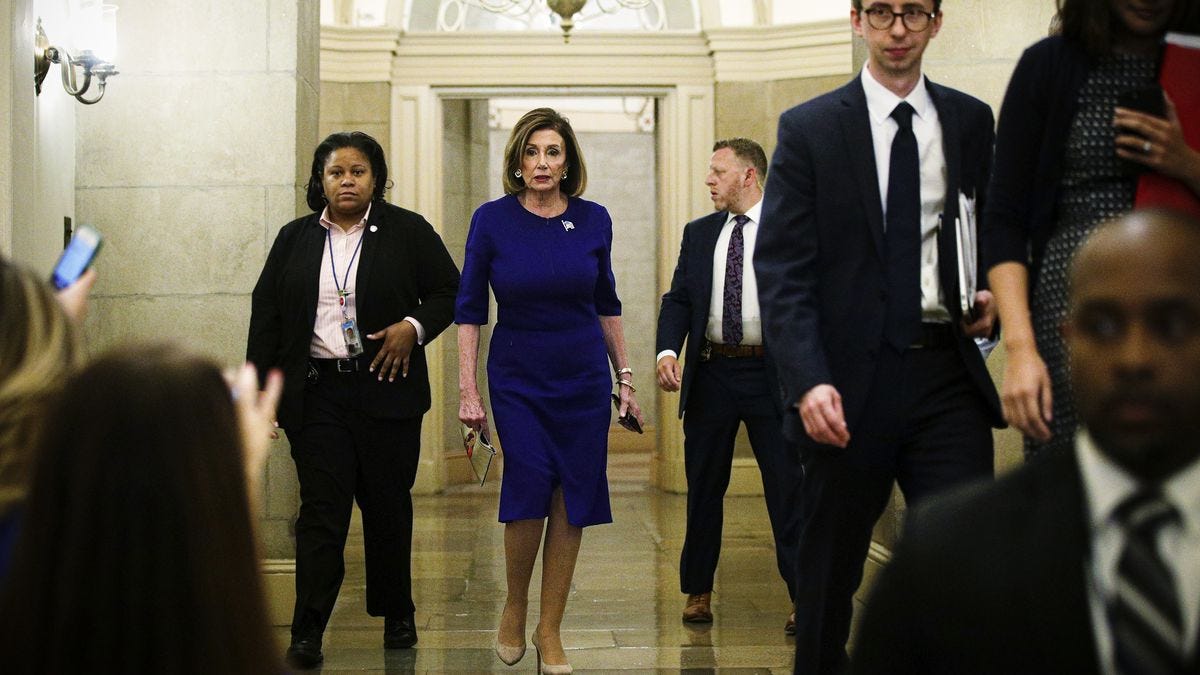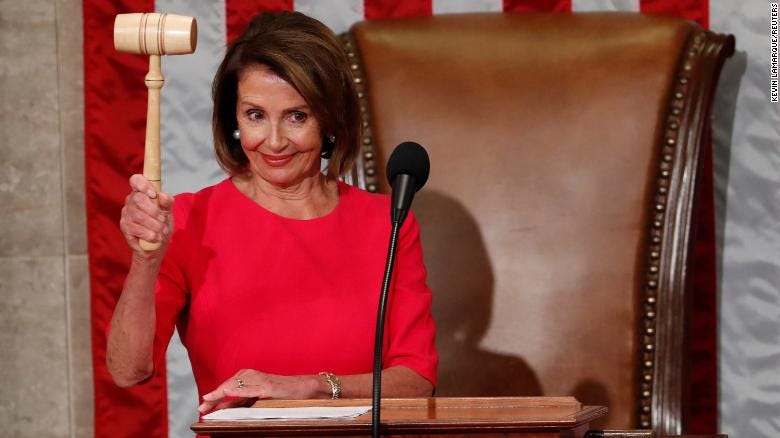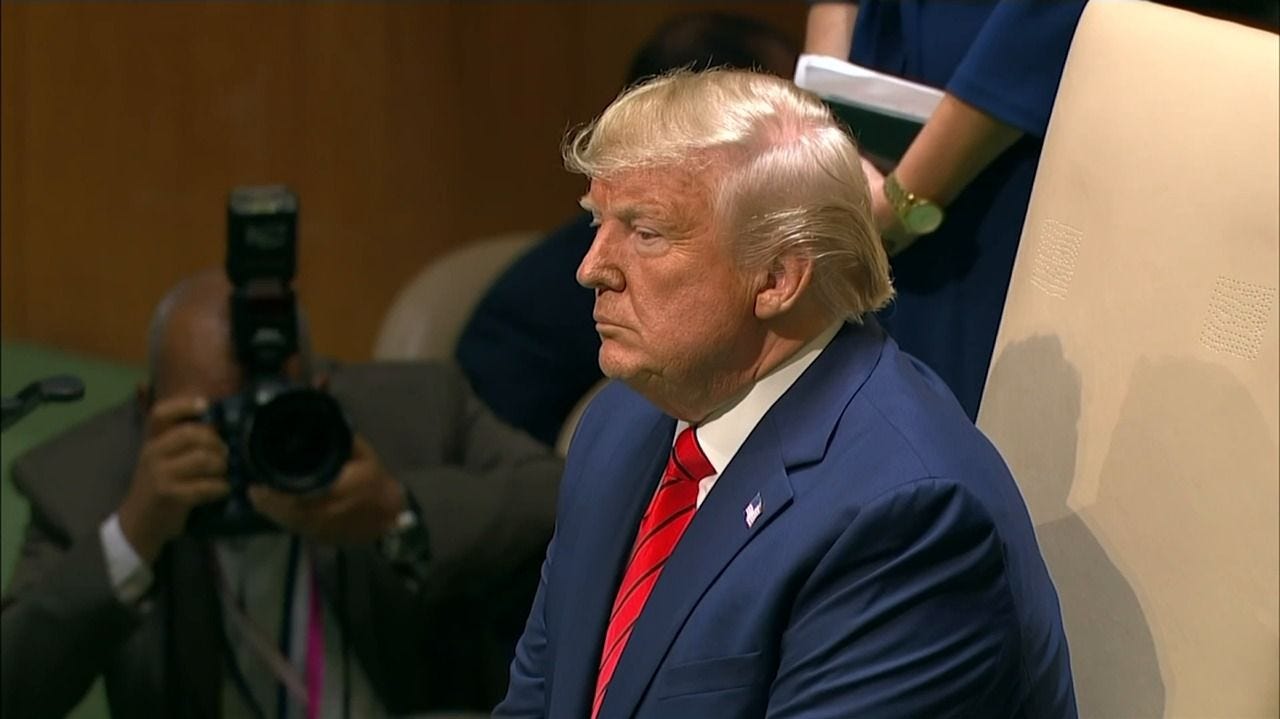My posts became subscriber only today, which means that if you haven’t signed up for a subscription, you missed out on getting this article below. Keep in mind, you will still continue to get my public posts every Tuesday with the free subscription, but you will miss out on articles like this one right as we enter the impeachment phase. You will also miss out on my What Had Happened Was Sunday recap of the most important events for the week. Don’t miss a thing, sign up now!
Now, let’s not waste another second — it’s impeachment day!

Following the release of reports that Donald Trump withheld military funding from Ukraine in an attempt to assist with pressuring them to investigate his political opponent, Speaker Nancy Pelosi announced yesterday afternoon that an impeachment inquiry would begin. Citing a need to hold the president accountable for “dishonorable fact of the president’s betrayal of his oath of office,” Pelosi explained that the formal process of impeachment was underway.
While it’s clear that the incidents involving Ukraine that are detailed in the whistleblower account are likely the catalyst for the turnabout by House Democrats on the issue of impeachment, it bears mentioning that the full report has yet to be released to Congress or the public. This will likely not be the case for long. Yesterday, the Senate passed a resolution (S.Res.325) that called for the immediate transmission of the whistleblower complaint received on August 12 by Intelligence Community Inspector General Atkinson to the Senate Intelligence Committee. This resolution had complete bi-partisan support and passed unanimously with no objections, even from Sen. Mitch McConnell (R-KY) who was standing on the Senate floor at the time.
The White House has also shifted strategy and plans to release some form of the whistleblower complaint and the inspector general’s investigative report on the complaint by the end of the week, although reports differ over how heavily redacted the copy will be. Since Director of National Intelligence Maguire is already scheduled to testify before the House Intelligence Committee on Thursday, it would seem that would be an opportune time for legal compliance with the whistleblower statute.

The first step in the impeachment process will likely be the presentation of a resolution on the House floor that directs the Judiciary Committee to open the inquiry. Rep. Jerry Nadler (D-NY) has already begun an impeachment investigation of sorts, so it’s possible that this formality might be overlooked since the process is technically already underway. But considering the historical significance of the moment and the tradition being invoked each time in the past, it’s more likely that the full House will proceed with a floor resolution to direct the House Judiciary Committee to open the formal inquiry.
The next step in the impeachment process involves the House Judiciary Committee opening a formal investigation on the appropriateness of impeachment given the facts. Once they’ve concluded, the committee will then make a recommendation based on their findings to the entire House of Representatives, who will then vote on articles of impeachment. The House of Representatives could technically set up a special panel to hold impeachment proceedings, or simply hold a floor vote on the articles or charges without any committee vetting them, but this is not likely.

A simple majority vote is required to pass Articles of Impeachment, which are the set of charges drafted against a public official to initiate the impeachment process. Once a vote passes on any of the charges levied against the president, he is technically “impeached.” In legal terms, being impeached in the House is the equivalent of being indicted.
“A well-constituted court for the trial of impeachments is an object not more to be desired than difficult to be obtained in a government wholly elective….The prosecution of them, for this reason, will seldom fail to agitate the passions of the whole community, and to divide it into parties more or less friendly or inimical to the accused. In many cases it will connect itself with the pre-existing factions, and will enlist all their animosities, partialities, influence, and interest on one side or on the other; and in such cases there will always be the greatest danger that the decision will be regulated more by the comparative strength of parties, than by the real demonstrations of innocence or guilt.” —Alexander Hamilton, The Federalist Papers: No. 65
Although the Constitution allows for Congress to remove a president during his or her tenure, lawmakers must vote to say that he committed “treason, bribery, or other high crimes and misdemeanors.” Note that in order to remove a president who has been impeached, a trial must occur in the Senate with two-thirds of the members voting to convict — the likelihood of Trump being removed from office given his majority support in the Senate is not likely.

At this point we don’t know the full ramifications of the whistleblower complaint because we still don’t have all the details. It’s possible that more information may come to light that further implicates Trump in such a way that he loses more support from Republicans in the Senate. Given the unanimous vote to demand that the complaint be turned over to the Senate Intel Committee yesterday, it’s possible that some major breach of national security could cause a defection from certain senators in their support of Trump. It’s possible, but highly unlikely given the extent to which Republicans have defended his egregious actions detailed in the Mueller report thus far.
“The actions of the Trump Presidency revealed the dishonorable fact of the president’s betrayal of his oath of office, betrayal of our national security and betrayal of the integrity of our elections. Therefore, today, I’m announcing the House of Representatives moving forward with an official impeachment inquiry. I’m directing our six committees to proceed with their investigations under that umbrella of impeachment inquiry. The president must be held accountable. No one is above the law.” — House Speaker Nancy Pelosi
The historical context of this latest decision by Speaker Pelosi needs to be recognized. Only two previous presidents have ever been impeached — Andrew Johnson in 1868 and Bill Clinton in 1998. Both Clinton and Johnson were acquitted in the Senate. Richard Nixon would have been impeached, but he resigned right before the House was set to vote on three articles of impeachment: obstruction of justice, abuse of power and contempt of Congress. Given the brazen nature of Donald Trump and his refusal to express remorse or shame, it’s not likely we will have any such luck.
If you like this piece and you want to help promote independent journalism from a female perspective, please support my work by forwarding this article to others or by gifting a subscription to someone else today.
Amee Vanderpool writes the “Shero” Newsletter and is an attorney, contributor to Playboy Magazine, analyst for BBC radio and Director of The Inanna Project. She can be reached at avanderpool@gmail.com or follow her on Twitter @girlsreallyrule.




Understanding the path is crucial for us as informed citizens. This is among the most consequential proceedings in our lifetimes, and our nations history. There is still so much work ahead, I look forward to your insight every day.
Thank you Amee.
Yesterday I was like a nine year old on Christmas morning in anticipation of how it would all unfold. I know we still have far to go, but this day needed to happen, in my opinion. Now we’ll have to watch the GOP sadly and pathetically try to shut it all down. Like Sarah Kendzior says, “we have an international crime syndicate masquerading as a government.”
Glad to be a subscriber. Thanks for your analysis, the inside look into the ways of Washington, and your sense of humor.